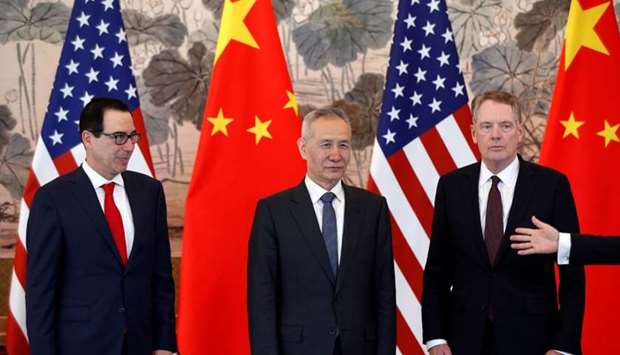China said on Tuesday that Vice Premier Liu He will go ahead with a visit to the United States this week, after efforts to reach a deal to end a trade war were thrown into doubt by US President Donald Trump's vow to impose new tariffs.
US officials have said China has backtracked on substantial commitments it made during months of negotiations.Those concerns prompted Trump to say on Sunday that he would raise tariffs on $200 billion worth of Chinese goods to 25 percent from 10 percent by the end of the week, and would "soon" target remaining Chinese imports with tariffs.
The president's tweets abruptly ended a five-month ceasefire in a trade dispute that has cost the two countries billions of dollars and disrupted manufacturing supply chains. The flare-up in tensions sent global stocks and oil prices lower on Monday, and raised speculation that China could cancel Liu's planned visit.
China's Commerce Ministry confirmed that Liu, who leads the talks for Beijing, will visit the United States on May 9 and May 10. The ministry did not elaborate or give the expected topics of discussion.
If Liu joins the delegation flying to the US, "it will signal how serious China is and indicates that China and the US are going to talk further," economists at ING said in a note earlier on Tuesday.
So far, the Chinese government's response to the prospect of new tariffs has been reserved, and on Tuesday, Foreign Ministry spokesman Geng Shuang told a news briefing that mutual respect was the basis for reaching a trade agreement.
"Adding tariffs can't resolve any problem," Geng said.
"Talks are by their nature a process of discussion. It's normal for both sides to have differences. China won't shun problems and is sincere about continuing talks," he said.
The nationalist Global Times tabloid said in an editorial that Beijing's willingness to go ahead with the visit in the face of Trump's tweets shows it would remain calm and "focus on the talks rather than engage in public opinion warfare".
"Even if the negotiations break down and Washington comprehensively raises tariffs, that does not mean the door to talks is closed," the paper said, adding that the impact on China of such a failure would be "controllable".
'EROSION OF COMMITMENTS'
US Trade Representative Robert Lighthizer, who has been an advocate for tough structural changes in China, said on Monday that Beijing had reneged on commitments it had made previously that would have changed the agreement substantially.
"Over the course of the last week or so we have seen ... an erosion in commitments by China," Lighthizer told reporters. "That in our view is unacceptable."
"We're not breaking off talks at this point. But for now ... come Friday there will be tariffs in place," Lighthizer said.
Treasury Secretary Steven Mnuchin, considered to be less hawkish toward China, said China's backtracking became clear with "new information" over the weekend. He declined to give specifics and said the US side had originally hoped to conclude a deal one way or the other this week.
"They were trying to go back on language that had been previously negotiated, very clear language, that had the potential of changing the deal dramatically," Mnuchin said.
"The entire economic team ... are completely unified and recommended to the president to move forward with tariffs if we are not able to conclude a deal by the end of the week."
China has repeatedly said it will make changes to open its economy according to its own timeline, not in response to trade disputes.
But recently it has enacted new laws and amended others, moves some see as efforts to address concerns shared by the United States and other foreign investors, including those from China's largest trading partner, the European Union.
The United States imported about $539.5 billion in goods from China in 2018 and exported $120.3 billion, for a record trade deficit of $419.2 billion, according to US Census Bureau data.
Trump lashed out over the trade deficit with China on Monday. "With China we lose 500 Billion Dollars. Sorry, we're not going to be doing that anymore!" he tweeted.
The United States currently has 25 percent tariffs on $50 billion of Chinese machinery and technology goods, and 10 percent tariffs on $200 billion of products from computer modems and routers to furniture, lighting and building materials.
Negotiations on removing US tariffs have been one of the remaining sticking points. China wants the tariffs to be removed. US officials want to keep some, if not all, as part of any final deal to ensure China lives up to its commitments. (Reporting by Beijing Monitoring Desk; Editing by Kim Coghill)

